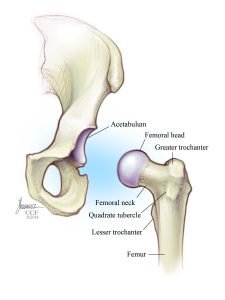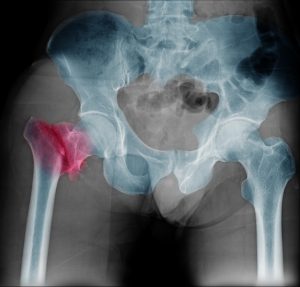Hip impingement
 A ball and socket joint, the hip joint consists of the acetabulum and femoral head. The femoral head fits into the acetabulum and can glide in many different directions, making it one of the most mobile joints. The rim of the joint consists of a piece of cartilage called the labrum, which locks the femoral head in the socket. A typically smooth moving joint, the hip joint can experience hip impingement or femoro acetabular impingement syndrome causing painful and catching movements. Hip impingement can potentially damage the joint, leading to early onset osteoarthritis of the hip joint.
A ball and socket joint, the hip joint consists of the acetabulum and femoral head. The femoral head fits into the acetabulum and can glide in many different directions, making it one of the most mobile joints. The rim of the joint consists of a piece of cartilage called the labrum, which locks the femoral head in the socket. A typically smooth moving joint, the hip joint can experience hip impingement or femoro acetabular impingement syndrome causing painful and catching movements. Hip impingement can potentially damage the joint, leading to early onset osteoarthritis of the hip joint.
Symptoms of Hip Impingement
Patients may not know that they have hip impingement. Hip impingement does not typically exhibit pain in the early stages and if it does feel painful, most patients associate it with a strained hip flexor. When confirmed that the cause of pain originates from hip impingement, a physician may call it Hip Impingement Syndrome. Symptoms of hip impingement include:
- Stiffness of the hip
- Inability or pain with hip flexion past 90 degrees
- Pain in the groin worsening with exercise or prolonged sitting
Causes of hip impingement
Hip Impingement falls into two categories: CAM and Pincer Impingement
In CAM Impingement, the femoral head has a slight or major defect. The shape of the head lacks the smooth shape necessary for proper hip function. The abnormal area of the head may get caught in the hip socket with flexion.
In Pincer Impingement, the anterior portion of the hip socket sticks out too far, creating a hook like structure. When a patient moves their hip into flexion, the femoral neck may hit the rim, causing pain and a decrease in mobility.
Some patients may have one type of hip impingement or may even have both.
Diagnosing Hip Impingement
If a hip doctor suspects hip impingent causing the patients pain, they perform a physical examination and order diagnostic testing. The diagnostic testing most likely consists of an X-Ray, followed with an MRI or CT scan if the X- Ray comes back conclusive. An MRI and CT allow the doctor to get a better look at the bony structures and abnormalities.
Ray comes back conclusive. An MRI and CT allow the doctor to get a better look at the bony structures and abnormalities.
How to treat Hip Impingement
Doctors recommend starting with conservative treatment to treat hip impingement. Conservative treatment includes:
- Rest
- Activity modifications
- Physical therapy
- Non-Sterioridal Anti-Inflammatory medications
If conservative treatments do not work, the treating physician may opt for surgical intervention.
To view a list of all insurances that AOA Orthopedic Specialists accept, click HERE. To schedule an appointment online, click HERE.
Experiencing hip pain? Call 817-375-5200 to schedule an appointment with a hip specialist today!
F.A.Q.
What is hip impingement, and how does it affect the hip joint?
Hip impingement, also known as femoroacetabular impingement (FAI), is a condition where there is abnormal friction and contact between the bones in the hip joint. It occurs when the ball-and-socket joint of the hip does not move smoothly due to excess bone growth or deformities. This can lead to pain, limited mobility, and potentially hip joint damage if left untreated.
What are the Symptoms of Hip Impingement?
Symptoms of hip impingement may vary, but often include hip pain, especially during activities like walking, running, or sitting for extended periods. You might also experience stiffness, reduced range of motion, or a clicking sensation in the hip. If you’re experiencing these symptoms, it’s important to consult a medical professional at AOA Arlington Orthopedics for a thorough evaluation and diagnosis.
How is Hip Impingement Treated?
The treatment for hip impingement depends on the severity and individual circumstances. Non-surgical options such as physical therapy, anti-inflammatory medications, and lifestyle modifications can often alleviate symptoms. In cases where conservative methods are ineffective, surgical procedures like arthroscopy may be recommended to correct the underlying bone abnormalities. The best course of action can be determined after a comprehensive assessment by our hip impingement specialists at AOA Arlington Orthopedics.

